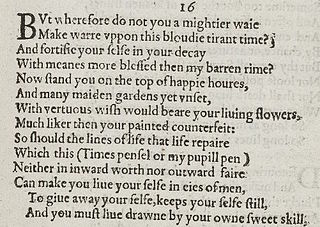The sonnet is a European form of lyric poetry.
Contents
Sonnet or Sonett may also refer to:
The sonnet is a European form of lyric poetry.
Sonnet or Sonett may also refer to:
Sonet may refer to:
Visa most commonly refers to:

Urban Hymns is the third studio album by English rock band the Verve, released on 29 September 1997 on Hut Records. The group had broken up while promoting A Northern Soul in August 1995, though they reformed two weeks later without guitarist Nick McCabe. Frontman Richard Ashcroft moved to Bath, Somerset, where he made demos; Simon Tong joined the group soon afterwards. Following aborted recording sessions with producers John Leckie and Owen Morris, the band sought a new guitarist, contacting Bernard Butler, who played with them for a week before departing amidst creative differences. In 1996, The Verve started recording at Olympic Studios in London, first with producer Martin "Youth" Glover, followed by engineer Chris Potter. Ashcroft contacted McCabe in early 1997, inviting him back into the band. Several songs were re-recorded to allow for the inclusion of McCabe's guitar parts, with sessions continuing into May 1997.
A bird is a feathered, winged, bipedal, warm-blooded, egg-laying, vertebrate.

Saab Automobile AB was a car manufacturer that was founded in Sweden in 1945 when its parent company, Saab AB, began a project to design a small automobile. The first production model, the Saab 92, was launched in 1949. In 1968 the parent company merged with Scania-Vabis, and ten years later the Saab 900 was launched, in time becoming Saab's best-selling model. In the mid-1980s the new Saab 9000 model also appeared.
Saab or SAAB may refer to:

Sonny Stitt was an American jazz saxophonist of the bebop/hard bop idiom. Known for his warm tone, he was one of the best-documented saxophonists of his generation, recording more than 100 albums. He was nicknamed the "Lone Wolf" by jazz critic Dan Morgenstern because of his tendency to rarely work with the same musicians for long despite his relentless touring and devotion to the craft. Stitt was sometimes viewed as a Charlie Parker mimic, especially earlier in his career, but gradually came to develop his own sound and style, particularly when performing on tenor saxophone and even occasionally baritone saxophone.

Arlöv is the seat of Malmö Municipality, Skåne County, Sweden. It is statistically not defined as a locality of its own, but forms part of the contiguous city of Malmö, 5 km northeast of downtown Malmö. Out of Malmö's 344,000 inhabitants, 11,000 live in Arlöv. However, in the 1950s, a public vote took place, deciding once and for all that Burlöv Municipality would never be a part of Malmö.

Thaddeus Joseph Jones was an American jazz trumpeter, composer, and bandleader who has been called "one of the all-time greatest jazz trumpet soloists".

"Lucky Man" is a song by English rock band the Verve. It was written by singer Richard Ashcroft. The song was released as the third single from the band's third studio album, Urban Hymns (1997). It was released on 24 November 1997, charting at number seven on the UK Singles Chart. The song was the band's second top-20 hit on the Billboard Modern Rock Tracks chart in the United States, climbing to number 16. In Canada, "Lucky Man" peaked at number 25 on the RPM 100 Hit Tracks chart. It also reached the top 40 in Finland, Iceland, Ireland, and New Zealand.

Lawrence Sam "Larry" Goldings is an American jazz keyboardist and composer. His music has explored elements of funk, blues, and fusion. Goldings has a comedic alter ego known as Hans Groiner.

"Sonnet" is a song by the English rock band the Verve and is featured on their third album, Urban Hymns (1997). It was released on 2 March 1998 as the final single from the album. The ballad has the same instrumental layout as "The Drugs Don't Work", consisting of acoustic and electric guitars backed up with a string section mainly consisting of violins.

Sonnet 16 is one of 154 sonnets written by the English playwright and poet William Shakespeare. It is among those sonnets referred to as the procreation sonnets, within the Fair Youth sequence.
Underneath or The Underneath may refer to:
Television is a telecommunication medium used for transmitting and receiving moving images and sound.

Pheeroan akLaff is an American jazz drummer and percussionist. He began playing in his hometown of Detroit, Michigan and Ann Arbor, with R & B keyboardist Travis Biggs, funk keyboardist Nimrod “The Grinder” Lumpkin, The Ebony Set and The Last Days. He moved to New Haven, Connecticut, and formed a group with saxophonist/flautist/percussionist Dwight Andrews. He debuted with saxophonist Bill Barron in 1975, followed by a tenure in Leo Smith's ‘New Dalta Ahkri’ (1977-1979).

David Stone Martin, born David Livingstone Martin was an American artist best known for his illustrations on jazz record albums.
"Au Privave" is a bebop jazz standard composed by Charlie Parker in 1951. Parker recorded "Au Privave" on January 17, 1951, for the American record label Verve. The origin of the title is unknown, though Parker is known to have played with words when naming his compositions. A variant of this title is "Après Vous", a song recorded by drummer Max Roach.
Sleepyhead(s) or Sleepy Head may refer to:
"Four" is a 1954 jazz standard. It was first recorded and arranged in 1954 by jazz trumpeter Miles Davis and released on his album Miles Davis Quartet. It is a 32-bar ABAC form.